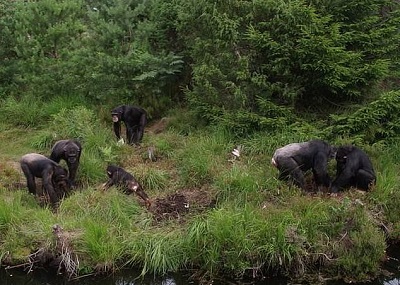Chimpanzees can figure out on their own how to use sticks as tools to dig up buried items of food — without needing a demonstration first.
An international research team led by the University of Oslo filmed chimps in a Norway Zoo after presenting the primates with buried fruit and various sticks ,according to Daily Mail.
The chimpanzees not only used various digging techniques but they also picked different shaped-sticks for different tasks and made their own tools from plants.
The findings may help researchers to understand how early hominins, our distant ancestors, began adopting tools for digging.
University of Tübingen researcher Alba Motes-Rodrigo and colleagues presented a troop of chimpanzees living in Norway’s Kristiansand Zoo with buried fruit and a selection of sticks that they could potentially use as tools.
Researchers found that, despite having had no training or previous exposure to other animals digging for food, they spontaneously used the sticks to dig.
The primates were seen performing a number of different behaviours with the makeshift tools — including digging, shovelling and perforating.
Chimpanzees also discriminated between different tool choices, preferring, for example, to use longer sticks as excavation tools.
The chimpanzees were also seen using naturally-occurring vegetation to make their own tools, which they then brought to the digging site.
This is the first time that this digging-with-tools behaviour has been filmed.
A second experiment similarly presented chimpanzees with buried fruit, but no tools with which to dig them up.
In this case, researchers found that the great apes preferred to preferentially use their hands to excavate the food, over that of making use of tools fashioned from nearby vegetation.
Researchers propose that developing the use of tools to dug up roots and tubers would have been a key behaviour learnt during human evolution.
‘These underground foods likely made up a significant part of the diet of early hominins during the transition from forested to dry habitats,’ said Ms Motes-Rodrigo.
However, we know little about the exact tools and techniques that our earliest ancestors would have employed.
‘This study provides novel data to help us understand early hominin behaviour using chimpanzees as behavioural models,’ Ms Motes-Rodrigo added.
N.H.Kh

